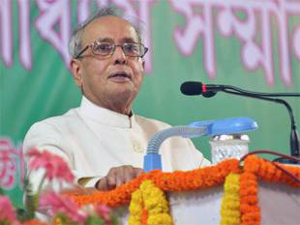New Delhi, Feb 9: Amidst controversies over the role of Governors, President Pranab Mukherjee today said all those who hold Constitutional positions should maintain sanctity of the Constitution.
"Our nation has grown from strength to strength since independence. It is primarily due to our steadfast adherence to the principles enshrined in our Constitution. It is an enduring document that reflects our aspirations and the avenues to achieve them, in an inclusive manner.
"It is incumbent on us all who hold constitutional positions to maintain the sanctity of this sacred text," Mukherjee said inaugurating a two-day conference of Governors at the Rashtrapati Bhavan here.
The President's call assumes significance against the backdrop of a raging controversy over the role of Governor J P Rajkhowa in Arunachal Pradesh that led to various developments culminating in the imposition of central rule. The issue is also being fought in the Supreme Court.
Terming as difficult the last year that saw terror attacks with "clear external linkages", he said the country has to continue efforts to resolve all outstanding international issues through peaceful dialogue and negotiations.
"We faced challenges from the global economic slowdown, climatic changes, and internal and external security. States having international borders were affected by terrorist attacks that had clear external linkages.
"Volatile external security environment makes it incumbent on us to upgrade our defence capabilities. At the same time, we have to continue our efforts at resolving all outstanding international issues through peaceful dialogue and negotiations," the President said in his inaugural address at the conference attended by 23 Governors and Lt Governors of the states and union territories.
Mukherjee said India is suffering the worst effects of drought with two consecutive deficient monsoons.
"Another dry spell is likely to impact agricultural production further. Farmer distress has to be addressed on a war-footing. The newly-launched Pradhan Mantri Fasal Bima Yojana aims at providing effective risk cover to farmers using technology. This and other measures to provide relief to farmers should receive top priority.
"To develop climate resilience, we must task our agricultural research institutions to develop drought-proof varieties of food grains and other food commodities," he said.
The President said for successful implementation of government's schemes like Make-in-India, Start-up India, Smart City Mission and Swachh Bharat Mission, these have to run in close partnership with state governments.
"As the constitutional heads of their respective states, Governors can play an inspirational role to ensure their active cooperation," Mukherjee said.
The President said there are over 320 state public universities and over 140 state private universities. Governors can also play a persuasive role in improving the quality of education in these institutions, he said.
Dignitaries participating in the inaugural session of the conference included Vice President Hamid Ansari, Prime Minister Narendra Modi, Home Minister Rajnath Singh, External Affairs Minister Sushma Swaraj and NITI Aayog Vice Chairman Arvind Panagariya, among others.





Comments
Add new comment